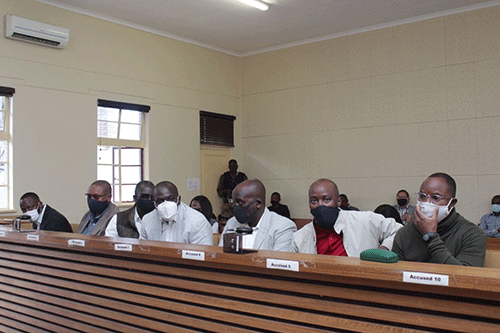The Institute for Public Policy Research is taking the fight against corruption to another level.
Executive director Graham Hopwood said it is frustrating enough that the Whistle-blower Protection Act, which was passed in 2017, has not yet been implemented due to a claimed lack of
resources.
He noted that these experiences of limited progress and continuing frustration have led them to believe they need to scale up anti-corruption work.
“We need to challenge complacency and inaction at government level. But we also need to seriously step up our anti-corruption games across various non-state sectors,” said Hopwood yesterday while launching a new project known as Integrity Namibia.
It is a three-year project which is funded by the US Embassy. The overall aim of the project is to establish a sustainable national anti-corruption network operating across civil society, the private sector, media, traditional authorities, faith-based organisations and other non-state actors.
He explained that in the absence of an official operational whistle-blower platform to receive reports of corruption and other wrongdoings, the IPPR will be launching its own platform to receive such reports in a confidential and secure manner.
“The corruption situation in Namibia has become so grave that we need the different sectors of society to stand up. We need the private sector, lawyers, churches, civil society, academia and media to stand up in efforts to fight corruption,” he stressed.
Looking at overall corruption in Namibia, Hopwood said the country is on a slippery slope, and adding to the frustration is the fact that a number of high-profile corruption cases have either not yet resulted in arrests, or are the subject of drawn-out court procedures.
“Such cases include Fishrot, the collapse of the SME Bank, the KORA Awards missing millions, the payments of the UK-based lawyers, the August 26 scandal and corruption in the government medical aid schemes, among others,” he outlined.
He added that there’s a growing sense that impunity is becoming a key issue in Namibia. “The sense that there are a class of people considered ‘untouchable’ because of their political connections and the lack of an effective assets declaration system for members of parliament and senior government officials, could be another factor.”
As a consequence, commentators believe corruption leads to an inefficient allocation of resources, poor education and healthcare, or the presence of a shadow economy, a kind of economy that includes illegal activities as well as unreported income from the production of legal goods and services for which taxes should be paid, but are not.
Last month, it was reported that Namibia fell two places in Transparency International’s (TI) Corruption Perception Index, much to the chagrin of the head of the country’s anti-graft agency. Anti-Corruption Commission director general Paulus Noa in January questioned the formula used to determine Namibia’s ranking on the latest corruption perception index.
“It appears TI has its peculiar way of ranking countries, particularly sub-Saharan countries. Their perception on corruption does not solely focus on factual corruption data, and how corruption is being dealt with by the respective countries. Their focus seems to be largely on economic, human rights and other basic rights,” Noa told New Era.
On a score of 100, Namibia dropped two points from 51 in 2020 to 49 in 2021. The results are given on a scale of 0 (highly corrupt) to 100 (very clean).


